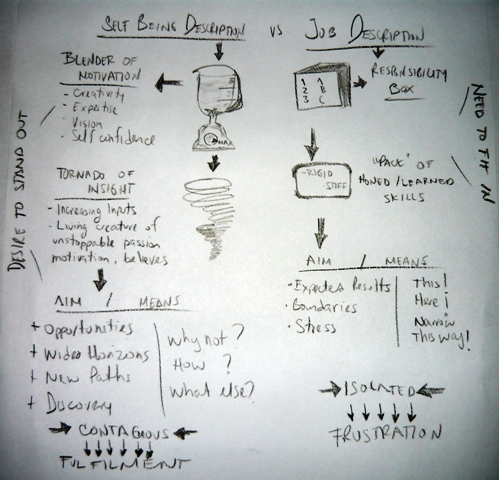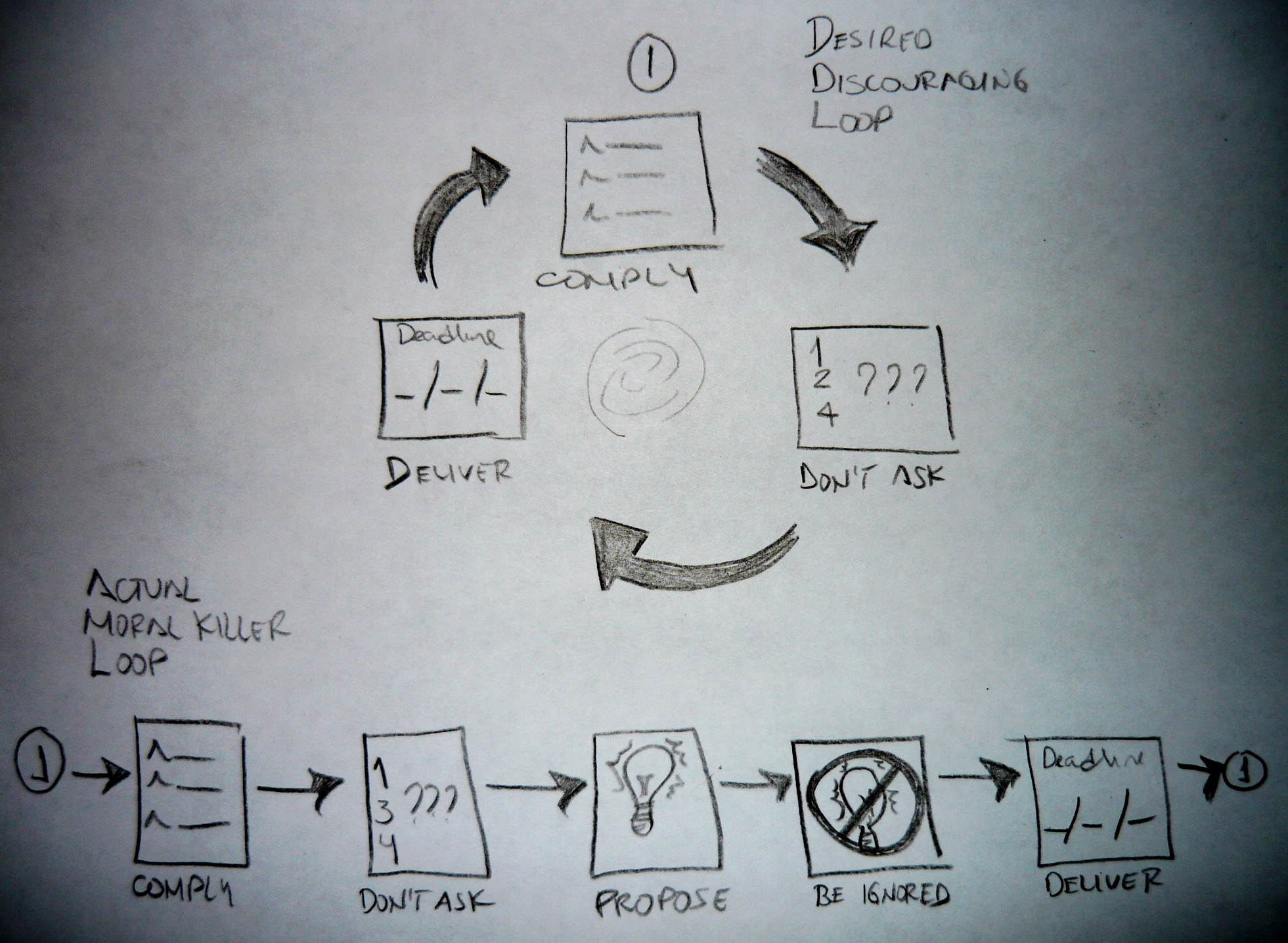Hack:
Getting the very best of employees. How?
- As management have remained unchanging for the last 60 years, companies continue struggling to fully “use” the best capabilities –and intentions - of their employees by eternally trusting in an organizational structure that has shown itself flawed over multiple attempts to improve company-employee relationships (if any) and profitable progress. “Members[1]” need to trust whom to share their sincere thoughts and ideas with. How to achieve this? Give them a proper communication channel –reliable- to tell you their best ideas. Let them choose their own bosses!
- There is survey behind all this. Check it out here http://cesarmalacon.tumblr.com/post/11728161214/how-brilliant-is-your-boss
[1] term which opposite to merely “worker” or “employee” brings a feeling of inclusivity to the people in the company,
Confined to a determinate set of tasks.
Companies WASTE plenty of their employees’ POTENTIAL because the structure of the corporate organisation keeps people bounded to a list of duties comprised in a job description (even if wide and vague still immobile and closed) from which the employee is NEVER supposed to get away by any reason. This diminishes the huge potential of some great people by denying them to explode their capabilities towards a greater good beyond complying with the held position. Bounded hands, trapped brains.
- Look at the 2nd image to watch a representation of what bosses expect from subordinated Vs. what they actually face from them.
The Boss/subordinated Relationship
All working positions have a hierarchically higher figure supposedly managing them to get the best from the worker. This Relationship can get so close and so influencing to each other’s lives that it gets hard for human beings to be completely honest and open toward each other because there is so much hanging from this relationship, either personal or professional, that taking any risk seems suicidal.
- Risks From the subordinated side:
- The boss to think they are idiots if coming up with an idea which not completely fits the manager’s mindset, better to keep silent. Of course!
The consequences of making the boss upset are too many.
- No salary increment, to be hold for a promotion, to lose credibility and hence power among others like “what if she steals my idea and gets the recognition from it when it should be me the applauded?”
- Feared Risk For the manager’s point of view:
- Managers have too little time to waste in unimportant ideas out of the scope of their important responsibilities,
- Because they might think subordinates would never come up with anything valuable so why to expect the implausible to happen?
- And there it is the always threatening possibility of having a smart subordinated capable to over shine them with their own bright of course –so why to support her?-
Leadership and technical skills dilemma
One barrier to overcome this is of course the appraisal system which includes the boss opinion for sure – bearing the “all mighty” syndrome feared by employees, keeping them frozen- .
But a bigger barrier is that it happens strictly in business that the organizational system is designed to promote up to “LEADERSHIP” positions those either with the higher technical knowledge or the longest antiquity in the company, -This if the promotion happens under the best terms-.
Any of these reasons should be never enough to make such decisions about leadership. It is very dangerous. This way in most companies to be on charge of a group of people happens more like an accident resulted from a series of “qualities” shown at the workplace; it could be loyalty, INDIVIDUAL (note the emphasis) performance, antiquity, charisma, bosses cajoling, resiliency, nepotism and even hypocrisy but it rarely happens for deploying proper leadership skills.
Look at the professional Sports
One clear analogy for this is that of how coaching happens in sports. The best sport coaches usually were not the best performers of the discipline they coach.
Take as an example Arsene Wenger Head Coach of the English football club Arsenal. He was a defender who had his professional debut at 29 years old (late laggard) and appeared only 12 times in that first season! And he never impressed anyone with his playing abilities. He actually did show a “vision of the field” superior to that of average players but this wasn’t enough to make him an exceptional footballer. Previously to his professional football debut he actually got a BSc in engineering and a master’s degree in economics in France. After honing his natural leadership capabilities and his mastery of the game strategy he deployed effective coaching to his teams and after many achievements throughout his career has been named the most successful coach of the world and He statistically is the best coach ever for the Arsenal club. His biggest accomplishment is having formed and developed a team of young players until the point of making it one of the best in the premier league trading off collective performance for the lack of individual ability. On the other hand we have a great recent example from the Argentinean ex-professional footballer Diego Maradona, considered for many as the best football player ever competing for the position only with Brazilian star Pelé. Well, during and after taking the Argentinean national football team to the last World cup in South Africa, Maradona proved himself to be a horrible coach. He is a great example of the point trying to make here, great performance rarely leads to great coaching. Maradona’s behaviour and “leadership deployment” can be catalogued as hilarious and even ridiculous if you witnessed any of his apparitions during the tournament. He has no people abilities, he can´t make a team to strive, he was an extraordinary player. But not a leader.
Organisational Politics and Behaviour
Back to the business arena: It is stated in an unwritten mantra of corporate politics that as a proactive employee you might be tempted to show yourself to your co-workers as a bold executive willing to make proposals and share insightful thoughts regardless of your roll but you must never try to attempt this if you are not being already successful fully delivering your job description’s responsibilities. Otherwise people will never take you seriously no matter how brilliant your ideas could be.
For me this is a “ideas killer” mantra. A very effective one in deed.
This pushes people to accept the status quo of the company however it is and to swallow any improvement opportunities they might find because of the perpetual threat of being labelled one of these show offers and lose any respect previously earned. Nobody wants that!
So how to get these ideas from employees without breaking any efficient rite and making an uncontrollable chaos in the company while fostering a proper environment for sharing?
Well, work still needs to be professionally done and there must be guidance and measurements to achieve results, however, “workers” doing the job are still humans.
We need to build a base in which the technically skilled (and knowledgeable) employees can co-exist with the intrinsic imaginative being most of us have. Still!
For example, a good worker might have an idea to improve the velocity of the process he is part of, but his boss was the one designing and implementing the current one so it will be hard for the employee to convince the boss to modify the result of such genius epiphany of his. This deeply embedded power game continues hindering any improvement attempt coming from inside the company.
The solution lies on setting apart the environment of the professional skilled worker’s [1]- the job description being- from the environment of the “idea generator and proactive member of the team” [2]– the self being description.
Look image 1 for a visual representation of what the “job description” means for proactive employees vs what the “self being description” approach brings to the company
Let the members to choose their own bosses
This can be done by embedding a “mentorship” mechanism –yes! With some levers to pull-.
By letting the members to choose their own bosses we will be complying with one basic leadership’s principle which is fundamental to build growth of teams. John C. Maxwell posits that people naturally follow leaders stronger than themselves. He calls it the “Law of respect”. It is really necessary to feel respect, to admire, to trust and to feel you can learn from your leader. If this rule is followed, a team will deliver results for sure. If the law is transgressed conflict will arrive –frustration-. But because jobs need ability and expertise to be properly done we need to have specialized profiles looking after the execution of such tasks –the bosses-, so the point is to give the technocrats technical bosses what they need and no more: A well prepared performer of specific tasks (worker), whereas leaving some room for action to the human imaginative being in a different context, out of the boss’ reach, as indicated below.
The mentorship mechanism
It is necessary to bring “humanity” back to our companies. Membership is required to gain comfort and trust so our people will share thoughts, ideas and insights without fearing being considered rude, stupid or pushy. By fostering a more trustful and honest environment among the “members” of the organization (Karen Ledge, 2003) companies would be able to get the best of their people without breaking any disciplined modus operandi, but just positively affecting the status quo. As Ben Simnton (2011) argues we need to stop pretending people don’t behave like people in the workplace because they actually do!
Stephen Cummings and David Wilson (2003) pose that language plays a vital part in organizing, by allowing members to choose who to talk to, organisations will gain an invaluable flow of proposals for improvement.
Hence,
- The “member” will choose any other member of the organisation who she trusts the most to be her mentor.
- They will hold periodical (you set the right number) casual meetings during which the mentored would speak out any idea of her own to get feedback and support from the mentor.
- The content of the ideas/thoughts/proposal is unimportant because we want to foster dialogue and innovative approaches to our practices and this part of the working life is completely different from the job description the member is attained to.
- When a submitted idea gets its way to implementation, indirect involvement from the member will be expected and allowed so she can supervise the process and learn from her proposal.
This is different to the 20% time for “working on what you want” way of Google, which actually is not what we thought it was, Scott Berkun did a deep analysis about this.
This is not like the structure of W.L. Gore & Associates because there, people actually choose what to work in. The project, the task to be done and the whole position is entirely decided by the employee, which is not really possible for many companies.
This is a way to bring a comfortable environment [context] to employees who want to contribute beyond the reach of their organisational limits in a sustainable and actually plausible way, possible to be implemented anytime.
[1] Environment: Let’s say the boss’ office. Think about it. Tension, tidiness, stiffness.
[2] Environment: Let’s say over a cup of tea, in a different storey, without desks between people trying to communicate.
- It will be no pushy. This will be an open mechanism. Every member should choose a mentor regardless position, level, department/business unit –let’s keep the VP+ levels out of the choice- but if members don’t want to speak about anything they won’t be forced to
- Good ideas will always reach daylight! opposite to current impersonal methods with no responsibility given to anyone to further actions to be taken
- Actually, due to the previous point, good ideas generation would be fostered among the members,
- Mentors would help and coach members on how to properly pitch their ideas (I know I can be beneficiated from this too! J - I got you-) and how to deliver the right message
- Motivation will be increased because the mentorship mechanism will give people a voice and a pair of ears willing to formally listen to them. This is the traditional method of “proposals inbox” super reloaded! If a member gives an idea, she would be able to track it until she gets a real feedback.
- Senior management would be able to realise who is a natural leader by the number of members asking for this person’s mentorship and hence build a leadership programme for them without fearing to choose the wrong candidates
- Fear of bosses will be halt because members know their bosses are limited to talk about members’ technical performance and not about the personal part of the job (always existing) and rising ideas from different subjects –not roll related
- Chosen mentors will strengthen their leadership ability by permission of their mentored members, for FREE! And they can get a feedback from mentored members too
- Senior management can be positively surprised by getting responses from parts of the organisation they never though: Dr. Alph Bingham, founder of Innocentive, recently talking about who actually solves most of their challenges mentioned that if you were to classify people across a spectrum of those who you believed would be most likely to solve the challenges on the left and those you believed would be least likely to solve the challenges on the right, most of the solutions come from the right-hand side.
- All this is: Kill fear and foster trust and,
- Due to the involvement of the member with the implementation phase, we can quote Daniel Pink and his identification of three key motivators for creative thinkers: autonomy (self-directed work), mastery (getting better at stuff), and purpose (serving a greater vision)all which are intrinsic motivators that build motivation in employees. Three of them are present in this hack.
- Decide with your senior leadership if the company is ready to undertake such daring approach to change and improvement
- Work the details of mentorship and coaching with an specialist to set the “how’s” of the mechanism
- Get the appropriate systems ready (software, intranet etc)
- Choose your best department and run a first trial stage after communicating the methodology to the chosen participants
- Evaluate the benefits and make the pertinent improvements. Notice that this trial is to get improvements not to decide whether to continue or withdraw from the endeavour because you already got the senior leadership on board so you’d better don’t waste the chance!
- Build the structure over which it should be supported –how many meetings at month, set a succinct explanation about how to hold the meetings for selected mentors, to specify the venue if there is a possibility for this and clarify the responsibility of being a mentor, establish the communication lines between mentors and senior leadership.
- Communicate the decision of implementing the mechanism through your own means to the whole organisation and deliver the training document (short video would be great). Of course a “cascade” communication methodology must be avoided
- Think about what would be the better way to get feedback from the mentors in a periodical basis –if outdoors, a day away from office, if the company is big maybe building local forces or making direct remote communication e-supported.


- Log in to post comments




You need to register in order to submit a comment.